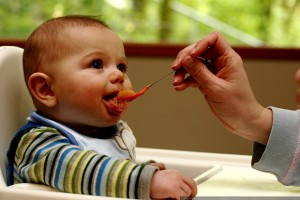She was a newborn only yesterday, but today your baby’s holding her head up all by herself. She’s so smart: pays close attention to what mommy or daddy are eating, and she’s mouthy like a puppy, always gumming her toys and her little fists.
If your baby is between the ages of 4 and 6 months, and exhibiting all these behaviors, it’s time to start introducing solid foods into her diet. Giving babies solid foods is a gradual process, but there’s no reason to be nervous. Combine a little intuition with these simple tips, and you’ll have no problem at all.
1. Know a baby’s eating stages
Instead of determining which solid foods are appropriate for your baby based on his age, treat consumption of solid foods as a natural skill that your baby is perfecting. Once he exhibits command of one step, introduce him to the next.
For example, step 1 might be cereal. Mix formula or breast milk with iron-fortified baby cereal (rice cereal is a popular choice, but oat grain and barley will also work). This combination tends to liquify, but serve it to your seated baby with a spoon. Once he gets used to being spoon-fed, you may gradually increase the amount you make, and reduce how watery you make it.
Step 2 would be pureed veggies, meats, and fruits. Introduce fruit, vegetables, and meats once your baby is comfortable eating cereal. Puree only one food item at a time, and don’t add any seasoning, even salt. If, after about three days, your baby hasn’t had any adverse reactions, move on to a new food. Over time, once he’s eaten a variety of single foods, you can mix them up, keeping them pureed.
Chopped foods is step 3. The final phase on the road to solid foods is finely chopping items that your baby can eat on her own, as finger foods. For most babies this phase occurs between 8 and 10 months, and consists of small portions of soft food items (fruit, pasta, vegetables, meat) or cereal (which becomes soft as your baby eats it).
A small portion should look like your baby’s fist. Three meals of solids aren’t necessary every day until the baby is about a year old, but feed him regular snacks. Once he’s about a year, you can mash or chop up whatever is being served to the rest of the family — with a few exceptions.
2. Be aware of potential food allergies
Certain foods, like nuts and fish, frequently cause an allergic reaction in humans. Unless your baby has a close relative with certain severe food allergies, don’t be afraid to try — in very small portions — feeding a variety of foods to your baby at home. Just be sure you closely monitor her while she’s eating anything potentially risky, and keep an antihistamine that can be administered orally in your kitchen. Avoid risky foods while at a friend’s or at a restaurant.
While many potential allergens are okay for your baby to try, there are some exceptions:
— Risky food 1: Milk
Before age one year, milk is not only unnecessary, it can actually increase the risk of iron deficiency in perfectly healthy babies. Cow’s milk contains negligible amounts of iron, which is something your baby should have plenty of.
— Risky food 2: Honey
If you haven’t already heard about Infant Botulism from your doctor, older family members, and other friends who’ve had babies, it’s possible you’re living in a cave. Nonetheless, it’s important to reiterate that feeding babies honey before a year old can be very dangerous.
3. Consider nutrients and nitrates
— Juice
It’s okay to give your baby juice, but excessive juice consumption can cause babies to have diarrhea, become obese, or develop tooth decay, and it’s not even as nutritious as you might expect.
Avoid juice entirely before 6 months, and after that keep the servings small. Make sure the juice is pasteurized, all real juice, and don’t give it in a bottle or sippy cup that can be nursed for prolonged periods of time. Be careful with citrus-derived juices, because they can cause babies to break out in a rash.
— Nitrates
Nitrates are chemical compounds found in many fertilizers. They’re popular and harmless when ingested in small quantities by adults. Unfortunately, babies have a tendency to metabolize nitrates differently than adults and are at risk of nitrate toxicity, aka Blue Baby Syndrome.
Well water can contain high nitrate levels; so can spinach, squash, carrots, green beans, and other veggies. If you have a rapidly developing baby, be aware that before 4 months, you should avoid feeding her these types of solid foods.
Follow these easy tips, and your baby will be eating crunchy, solid foods before you know it.
Originally posted on August 21, 2013 @ 10:49 am
